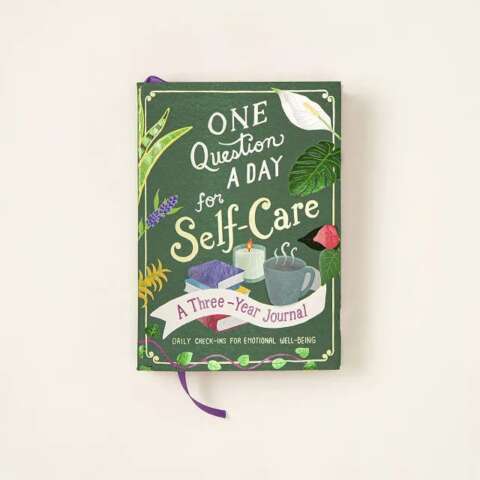It’s Mental Health Awareness Month! Here are 7 ideas to prioritize self-care and tips from a mental health expert.
| All products featured on The Wellness Feed are independently selected by our editors for its environmental and ethical impact. However, when you buy something through our retail links, we may earn an affiliate commission. |
Burnout culture- working until physical, mental, and emotional exhaustion – is no longer a status symbol in work culture. Work-life balance and embracing ideas for self-care are now hailed as the ideal. From end-of-the-day bubble baths to Ayurvedic resort vacations to restore mental and emotional health, self-care is about taking the time to do the things that improve your mental and physical health. Whether it’s a daily or yearly ritual is up to you.
“Once I get home, I try to disengage from work and outside stressors as much as possible. Namely focusing on self-care so that I can be everything my loved ones and patients need,” says Kristy Fundora, MSN, CRNP, PMHNP-BC. As a psychiatric mental health nurse practitioner in New York City, she stresses that ideas for self-care are all about you. “It simply depends on you and what YOU find to be therapeutic. Some enjoy cooking, journaling, coloring/painting, exercising, meditating, bubble baths, listening to music, watching television, or just sitting in a quiet space for a few minutes.”
If you understand the importance of self-care but can’t seem to find the time to practice it, you’ve come to the right place. Here are easy steps to start prioritizing yourself.

Set Aside Time
Understanding the need for self-care is one thing, but taking the steps to actually prioritize it, including seeking professional support to navigate life’s challenges, can profoundly impact your well-being. Finding a therapist online can be a crucial part of your self-care routine to ensure you’re not only addressing physical but also emotional and psychological needs.
“I rely HEAVILY on my planner, as a means of staying organized and maintaining a sense of balance,” Kristy says. Planning will ensure you have enough time each day to spend practicing self-care. Of course, it depends on what your version of self-care looks like. To some, self-care involves exercise, but to others, it means setting aside time where they can focus on a hobby or activity they enjoy, such as reading a book.
The good news is you don’t need to set aside a large chunk of time to practice self-care, you can start by claiming 15 minutes a day for yourself. For some, losing just fifteen minutes a day is enough to induce anxiety because they feel like they have so much work to do and not enough time to finish it. However, taking time out of your day that allows you to focus on yourself and your needs can make you feel more productive.
Eat Well
Self-care involves taking care of your body’s needs. Nourish from the inside out and include dark leafy greens, berries, legumes, and other whole foods in your daily meals. If your doctor suggests filling in nutrient gaps in your diet, you can buy energy supplements made from clean active ingredients to give your body the boost it needs. By giving your body what it needs to thrive and deal with life’s physical, mental, and emotional stressors, you’re doing exactly what you need to do to correctly fuel your body for the rest of its day. Eating nutrient-rich foods that aren’t processed has been shown to improve your mood and ability to focus.
Move Your Body
“Try to move your body periodically and schedule a fun activity to break up the monotony and get those endorphins flowin’!” Kristy suggests finding a way to move in a way that brings you joy. Even the busiest of us can find a way to regularly take time for a walk, join a dance class or do yoga at home. While sometimes getting up early to go to the gym or taking a walk during work can feel like a chore, you’ll eventually get into the habit of working out, and it might even become fun. You’ll also notice an increase in your energy levels and mood, which can help you be more productive during the day.
Avoid Multitasking
It’s a common misconception that doing multiple things at once helps you get things done faster. When you can’t focus all of your energy on one task, it can take you much longer to complete all of your tasks. Multitasking also decreases the quality of your work, so if you’re doing something important, you might notice small errors you wouldn’t have made if you were focusing on that one task. Making errors means spending even more time going back and making corrections, so there’s no reason to multitask.
“Create a realistic and manageable schedule. Maintaining structure creates a sense of safety and stability,” Kristy suggests. “Manage your work/school schedule by implementing breaks to maximize productivity. Make sure to include hygiene and self-care, meal times, and video-call/text sessions with family and friends to stay connected. Try to move your body periodically and schedule a fun activity to break up the monotony and get those endorphins flowin’!”
Avoid Comparing Yourself
If you’re someone who loves to scroll social media and learn about what’s going on in other people’s lives, it can be easy to compare your life to someone else’s. Remember, you don’t know much else about what could be going on in someone’s life, so there’s no reason to compare yourself to them. So the next time you get jealous that a friend you had in high school went on a three-week-long vacation to the Bahamas, take time to value all of the good things you have in your life. And you can even take time to disconnect. “While it is necessary to stay informed on new and pertinent information, try to limit screen time and disengage. Remember, it is ok to disconnect,” Kristy suggests.

Practice Gratitude
Instead of worrying about what you don’t have, focus on what you do have. By practicing gratitude, you can train your brain to be more positive in everyday stressful situations. Instead of worrying about the fact that you missed a deadline or your boss didn’t like your presentation, you can focus on the good things, including the things you have in your home life, such as your family and pets.
Practicing gratitude is easy, and you can do it any time of day. If you truly want to train your brain to be more positive, consider writing in a journal every night. You can simply list all of the things you’re grateful for to remind yourself why you should be happy.
Journaling also comes with other benefits, such as improved mood, and can help you relax enough to fall asleep faster at night.
Start a Routine
“Without a routine it is easy to feel an overwhelming sense of disarray, making us feel like we’ve lost control or command of our lives,” Kristy explains. Now that you understand all of the ways you can start prioritizing self-care, it’s time to add it to your daily routine. Again, all it takes is 15 minutes (or less) a day to start practicing self-care. Your self-care routine can include anything from using your daily skincare routine to walking your dog around the neighborhood. Whatever you choose to do, make sure it’s something that will benefit your life in some way.
Become a Priority in Your Own Life
“Once I get home, I try to disengage from work and outside stressors as much as possible. I’m running through the AFI top 100 classic film list, planning future vacations while watching travel documentaries, taking long showers, cooking, reading, and exercising,” Kristy shares her daily self-care practices. “I’ve had a few video-call happy hours and brunches with friends and family as well. Namely focusing on self-care so that I can be everything my loved ones and patients need.”
Before you can start prioritizing self-care, you must realize you should be a priority in your own life. Treat yourself the same way you would your best friend by never putting yourself down and trying to focus more of your energy on the good things you have in life.







